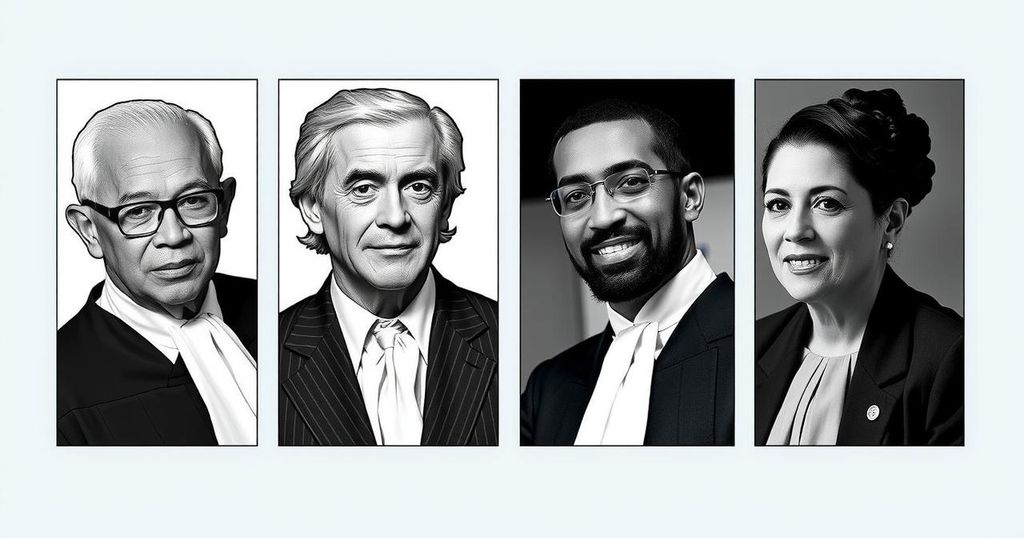Bolivia’s Judicial Elections Highlight Lessons for Mexico’s Judicial Reforms
Bolivia’s recent judicial elections, characterized by public apathy and controversial implications for democracy and judicial independence, have drawn attention as Mexico prepares to adopt a similar system. As political tensions persist and voter engagement remains low, the outcomes of these elections may offer crucial insights for both countries regarding the governance of judicial appointments.
The recent judicial elections in Bolivia, which were conducted under a system of direct popular vote, have sparked significant discourse on the implications for democratic integrity and judicial independence. While campaigning is prohibited, candidates cleverly leveraged media and branding techniques to attract votes amid widespread voter apathy regarding the contenders. With elections for top judicial positions being a unique trait of Bolivia’s political landscape, Mexico is preparing to adopt a similar framework following governmental reforms advocated by former President Andrés Manuel López Obrador.
President Luis Arce has portrayed the election as a pivotal moment for democracy, yet many voters express skepticism regarding the efficacy of such a system. The phenomenon of voters resorting to random decisions, as in the case of 25-year-old Marisol Nogales, highlights the lack of knowledge about the candidates and raises concerns about the competence of elected judges. With mandatory voting compounding the public’s frustration at the long lines at polling stations, the environment surrounding the elections has been described as chaotic.
The elections, which were postponed due to conflicts within the ruling political party and accusations of power struggles, feature only a partial election of four out of nine positions in the Constitutional Court. Observers have noted that political manipulation of the judiciary often erodes democratic principles, with prominent political analysts suggesting that the electoral system fosters the dominance of the ruling party. Additionally, there have been allegations concerning the legitimacy of elected judges and their potential partisanship.
Bolivia’s judicial election process was established in 2009, replacing a more traditional nomination system based on qualifications. Critics have pointed out that this shift has made the judiciary more susceptible to political influence, with many arguing that it threatens the system of checks and balances essential for democratic governance. Historical precedents demonstrate that abuses of power and manipulation of the judicial system can arise from such politicization, with Bolivia’s political milieu revealing the precarious balance between judicial independence and political authority.
As Mexico prepares to implement a similar electoral process for judges, Mexican authorities, including President Claudia Sheinbaum, are closely observing Bolivia’s ongoing elections. The forthcoming results are likely to provide valuable insights into the functioning and consequences of directly elected judges in a politically charged environment. The international community will watch to determine whether Bolivia’s elections serve as a cautionary tale or a model for Mexico.
Bolivia’s unique judicial election process, established in 2009, allows citizens to vote directly for top judicial positions, a rarity in democratic nations. This direct election approach has led to public dissatisfaction regarding candidate transparency and competence, raising concerns over the politicization of the judiciary. The practice stands in stark contrast to Mexico’s traditional judiciary model, which is undergoing significant reforms under President López Obrador, who advocates for similar elections amid discussions on enhancing judicial accountability. The elections reveal deep-rooted political conflicts and the challenges faced by systems in evolving democracies, as governments grapple with issues of corruption and public trust in judicial independence. Historically, Bolivia has faced significant political turmoil, particularly during Evo Morales’s tenure, characterized by issues of electoral manipulation and judicial overreach. The current scenario highlights the ramifications of previous judicial reforms and sets the stage for potential outcomes that could influence Mexico’s reformative journey.
The Bolivian judicial elections serve as a critical examination of the implications of direct electoral processes for judicial appointments. Voter apathy, challenges to electoral legitimacy, and concerns about political manipulation point to a complicated relationship between democracy and the judiciary. As Bolivia navigates its electoral landscape, Mexico observes closely, poised on the brink of implementing a similar electoral framework. The outcomes of these elections could provide pivotal lessons for both nations about the intersections of judiciary independence, political authority, and public confidence in democratic processes.
Original Source: www.newspressnow.com




Post Comment